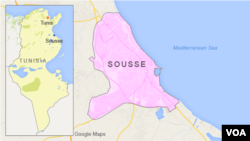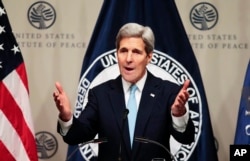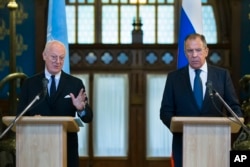Secretary of State John Kerry said Friday that the “eyes of the world are on Tunisia” and that America wants the country, considered the birthplace of the Arab Spring, to succeed.
He commented from Tunisia, the first stop on a three-nation tour that will focus heavily on political and security instability in Syria.
In a joint appearance with Tunisian Foreign Minister Taieb Baccouche, Kerry said the United States had provided Tunisia with more than $700 million in assistance in 2011 and had committed to plans to provide a new loan guarantee.
Baccouche said neighboring Libya was a source of concern because terrorism was becoming “firmly established” in the country. He said Tunisia would welcome U.S. support to help it secure its borders.
Arab Spring uprising
Tunisia has received broad U.S. praise for its democratic reforms in the aftermath of the Arab Spring uprising.
However, the country suffered a severe blow to the critical tourism sector of its economy following a pair of deadly attacks this year, including a June attack in the resort city of Sousse that left 35 people dead.
The Islamic State group claimed responsibility.
“The Sousse attack resulted in a stepped-up security consultation process between Tunisia and the G7, which we also participate in and which we found very useful to prioritize," a senior State Department official said in a Thursday briefing. The objective, the official said, is to "make sure we’re all helping Tunisia in the best way possible.”
In Tunis, Kerry is meeting with President Beji Caid Essebsi as part of the second U.S.-Tunisian Strategic Dialogue, and members of the National Dialogue Quartet. The group won the Nobel Peace Prize for its role in promoting democracy after the nationwide protests led to political upheaval in Tunis nearly five years ago.
New Syria talks
Later Friday, Kerry travels to Vienna for the second meeting in recent weeks on finding a political resolution to Syria’s crisis.
On Saturday, officials from 17 countries, plus the United Nations and the European Union, will launch talks on the crisis.
"I cannot say this afternoon that we are on the threshold of a comprehensive agreement," Kerry said Thursday in Washington. "There remains a lot of work to be done."
In a communique at the end of the first round of talks in October, world powers and the U.N. agreed on the importance of accelerating diplomatic efforts to end Syria's civil unrest.
They also agreed to a U.N.-led process that would include talks between the Syrian government and the moderate opposition, along with a possible cease-fire. But stark differences remain over some issues, especially the status of Syrian President Bashar al-Assad.
Russian proposals
Russia has floated several proposals for the upcoming talks. It circulated a plan for ending the Syrian war that calls for drafting a new constitution in up to 18 months.
Syrian opposition groups said the plan was unacceptable because Russia's goal appeared to be keeping Assad in power. Western diplomats indicated the plan would not be a central issue in Saturday's talks.
Russian Foreign Minister Sergei Lavrov also has said the meeting in Vienna should get all sides to agree on which terrorist organizations are operating in Syria — another issue that concerns opposition groups fighting against Assad.
"There is no meaningful moderate opposition," said Anthony Cordesman, a defense and security analyst at the Center for Strategic and International Studies.
"There are people who have a certain credibility as figures," Cordesman said. "They do not represent any clear factions or large majority of Syrians."
The makeup of the Vienna talks could help produce progress on this issue, said Perry Cammack, a Middle East analyst at the Carnegie Endowment for International Peace.
"The Vienna talks themselves are a broad tent, so I think we need to use that principle for the opposition as well, to include as many groups as we can," he said.







